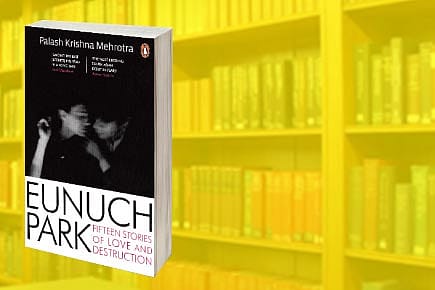A Cocktail of Contradictions

Expect the unexpected in this collection of 15 short stories on everything from homicide to perversion
Fulsome praise on the back cover could often be a cause for confusion while judging the merits of a book. Is the writer of the blurb a friend of the author/publisher or, worse still, are the compliments aimed at creating a clever camouflage for professional jealousy? In Eunuch Park, the blurbs are hopelessly inadequate in distilling all that is delightful and disturbing in this collection of short stories. Reading the 15 stories is a little like having a ringside view of a Formula One car race. Anything could happen here and it would be safest to expect the unexpected.
The ingredients for a commercially successful book are all here: homicide, cross-dressing, sex, scandal, perversions, prostitution, drink, drugs, chillum, perineum. Mehrotra, however, dodges the pitfalls of being formulaic by the knack of being unpredictable. True that school/college campus settings play themselves out many times, as do themes of same-gender attraction. But it is in the deft handling of these concepts that Mehrotra comes across as truly wacky.
While murder frees some people, it imprisons another to demons of the mind ('Fit of Rage'). A teacher reacts most unpredictably in the face of student insolence in a squeaky clean story that is for some reason called 'Pornography', while in the title story, which revolves around the age-old theme of boy-regularly-meets-girl-in-clandestine-manner, things take a bizarre turn.
Openomics 2026: Continuity and Conviction
06 Feb 2026 - Vol 04 | Issue 57
The performance state at its peak
Probably one of the finest stories here is 'Nobody Wants to Eat My Mangoes', a piece of writing that brings alive the sights, smells and sounds of downtown Bombay, broods over the bone-weariness of suburban life and doesn't hesitate to explore a grown man's tears. The transient nature of young relationships and the sheer irreverence of hostel life (a story in which a couple of wall lizards play a pivotal role) are captured delightfully in 'Bloody and the Friendship Club.' Mehrotra walks the reader down the sleazy alleys of the Delhi slums on a wintry night in 'Okhla Basti' and he repeats the venue in yet another story, while the language turns correspondingly coarse and abusive.
There are endearingly familiar touches through the narrative and one recognises homely things like Parle toffees, Gold Flake cigarettes, Doordarshan, Mithun Chakravarty and the tinny lyrics of songs from Hindi movies. A few stories appear to be lacking in both plot and direction ('Touch and Go', 'Rubber Band') and one wonders whether they were merely added to lend width to the spine of this slim volume.
To rattle the straitlaced reader is obviously high on Mehrotra's list. All in all, an interesting and unusual read, though the book remains a cocktail of contradictions. The quality of writing is mediocre in places and inspired in others. The plots veer from the tricky and focussed to the ambiguous and amorphous. It's a wild journey down these pages of near madness.
Kankana Basu is the author of Cappuccino Dusk, longlisted for the 2007 Man Asian Literary Prize
